Get by, get through, get rolling: Pushing Boarders reflections part 2
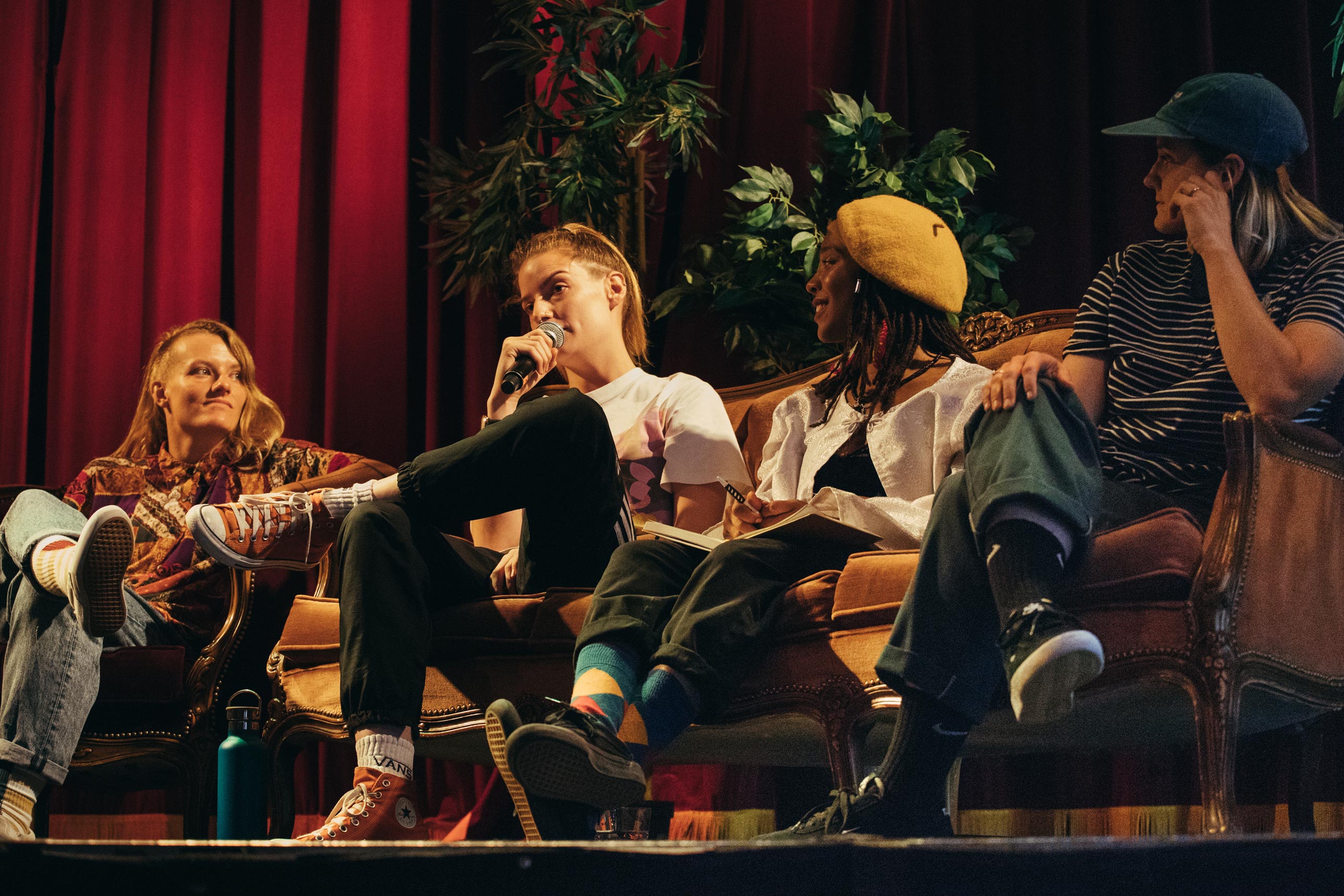

Celebrating Pushing Boarders’ release of videos of all the talks in Malmö, Sweden, Part 2 of this 3 part series asks womxn and non-binary individuals who were there to discuss the conference’s theme of mental health and skating ‘as us, for us’.
The Pushing Boarders conference, now in its second year, was held in August in Malmo, Sweden. The event is unique in that it takes what are usually separate worlds — that of skateboarder and the academic — and fuses them together with daily talks, skate sessions, skate demos, art exhibits and films. The event was also part party, part think tank and, informally for many, part therapy. Above all, it aimed for ‘real talk’ and to push skateboarding forward. In this article — Part 2 of this 3 part series — Dr Indigo Willing who was on the University of Skate: Support Your Local Academic panel keeps the conversation rolling with womxn and non-binary individuals who were there.
In Part 1 panelists, event volunteers and attendees reflected on the evolution of skateboarding and why Pushing Boarders is a sign of the times. Although grateful to important pioneers, there was not a yearning for ‘the good old days’ and glowing tales of how skateboarding once was. Instead, game changers in skateboarding such as Mimi Knoop, Kim Woozy, Lucy Adams, Candy Jacobs, Imke Leerink from Girls Shred and Atita Verghese from Girls Skate India, plus skate academics and and many others, kept things constructive but unromanticised. All kinds of challenges were revealed as well as how they have independently and creatively been overcome across the years. Pushing Boarders was also described as an evolving event that captured a lot, but not all of the populations and issues that warrant time and space. But overall, there was a unanimous feeling that it was a remarkable event for what it did achieve, and for its ongoing impact long after everyone went home.
Bringing so many people with different areas of expertise and experience together presents a unique occasion to not just talk, but also feel, interact, relate and socialise in ways that can be refreshingly different. There were plenty of high fives and fist bumping which added warmth and familiarity to the conference but also unguarded moments of emotional rawness. Pushing Boarders promoted a mode of care that involves listening to others, and ourselves, rather than having to just ‘shut up and skate’. This article explores the question: if we don’t have to shut up and skate, especially when things are not going OK, what things do we want to say? And more crucially, what things do we need to say?
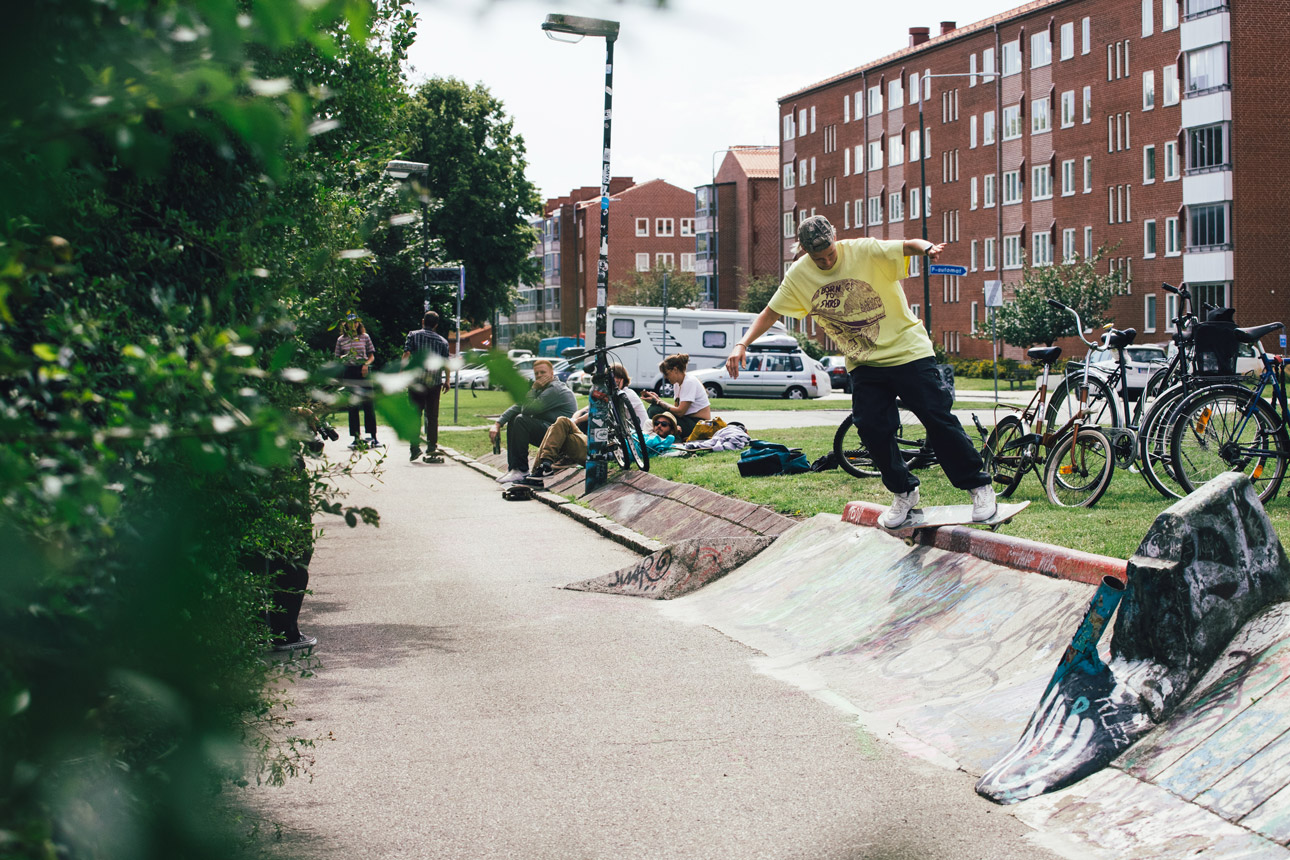
Care note: the topic of mental health and suicide is discussed in this part of the article with an emphasis on preventation, support and healing strategies.
The phrase ‘skateboarding saves lives’ is popular, but one of the bitter-sweet gifts at Pushing Boarders was the realisation that we need to be very careful not to rely on that sentiment alone. Skateboarding can have remarkably beneficial neurological and physical effects on us. This includes positive results for individuals impacted by traumatic life experiences, as shown in the Push to Heal video with Joel Pippus from Hull Skateboarding. We can express significant parts of our identity, and an authentic side of ourselves through skateboarding. But in any given skate scene are skaters who struggle, and some do a lot. Suicide is also sometimes a part of the world of skateboarding. There are skateboarders who understand what that is like to feel like taking their own lives or having lost someone to suicide. It is important to hear from those who made it through the dark times and are normalising discussions of mental health, including suicide.
Lucy Adams, who chaired The Revolution will not be Patronised panel is one of the UK’s most recognisable pro-skaters. Quick witted, funny and compassionate, her charisma on stage is as watchable as her skating. Yet she also offers an example of how some of our most admired and well-known skaters can be hit by serious states of depression or inner hurdles we cannot see. Lucy explains that, “In 2016 I went through a long period of depression leading to suicidal thoughts. I don’t think I’ll know exactly what the causes were but I do know that at that time it was actually impossible for me to skate because I couldn’t engage in that battle of learning a new trick. And just ‘cruising’ or whatever wasn’t enough to have fun”. She also stopped skating for 3 months — “the longest break I’ve ever had in 22 years of skating and it was crushing but trying to skate was more demoralising than anything, because I couldn’t have fun just rolling around, I couldn’t think of any positive thoughts”. While she feels there is no easy answers to why this happened, she states, “what I do know is it passed for me. It passes and times begin to feel better again. Since then I’ve had huge highs and times that have been so great that I couldn’t have dreamed of”.
We have to remember not to be hard on ourselves if we don’t always feel great, even if we skate. Dr Dani Abulhawa from The University of Skate: Support Your Local Academic panel (chaired by Dr Sander Holsgens and Stuart Maclure) and co-organiser of the Academic Forum at Pushing Boarders cautions, “I am concerned there can be an overly evangelical way we think about skateboarding (consider #thankyouskateboarding). It is important to recognise where skateboarding helps and works, and where it can also be part of the problem”. Kat Sy from Skate Like a Girl who went to hear the talks also points to the need to avoid relying on skateboarding alone. She explains, “For those who use skateboarding as a therapeutic outlet I’d give the pragmatic advice of finding other outlets besides skateboarding that are perhaps less physically taxing, because the combination of inevitable injury and mental health issues can be a deadly pair. The creativity, mentality, and physicality of skateboarding is not unique to skateboarding and skateboarding is not the answer to everything”.
“It is important to recognise where skateboarding helps and works, and where it can also be part of the problem.”
When we are not rolling, we are often scrolling on our phones and we also have to remember this is not necessarily a bad thing. Social media is often pigeon-holed as trivial or harmful to people’s self-esteem but it can also reach people in ways that may make a real difference. For instance, the Ben Raemers Foundation dedicated to the remarkable, well liked and admired young skater who lost his life to suicide this year reached over 10,000 followers on Instagram in just 2 weeks after its launch. Bethany Geckle, a presenter on the Academic Forum feels that, “Ben Raemers’ legacy has been to initiate important conversations in skateboarding and prompt people to seek and offer help”. She believes, “There is also a ripple effect in allowing yourself to be vulnerable and asking for help. That level of vulnerability and intimacy expressed (and particularly between men) is special and so desperately needed”. However, Bethany also recognises that, “those conversations are usually private, so it’s hard to tell their effect”.
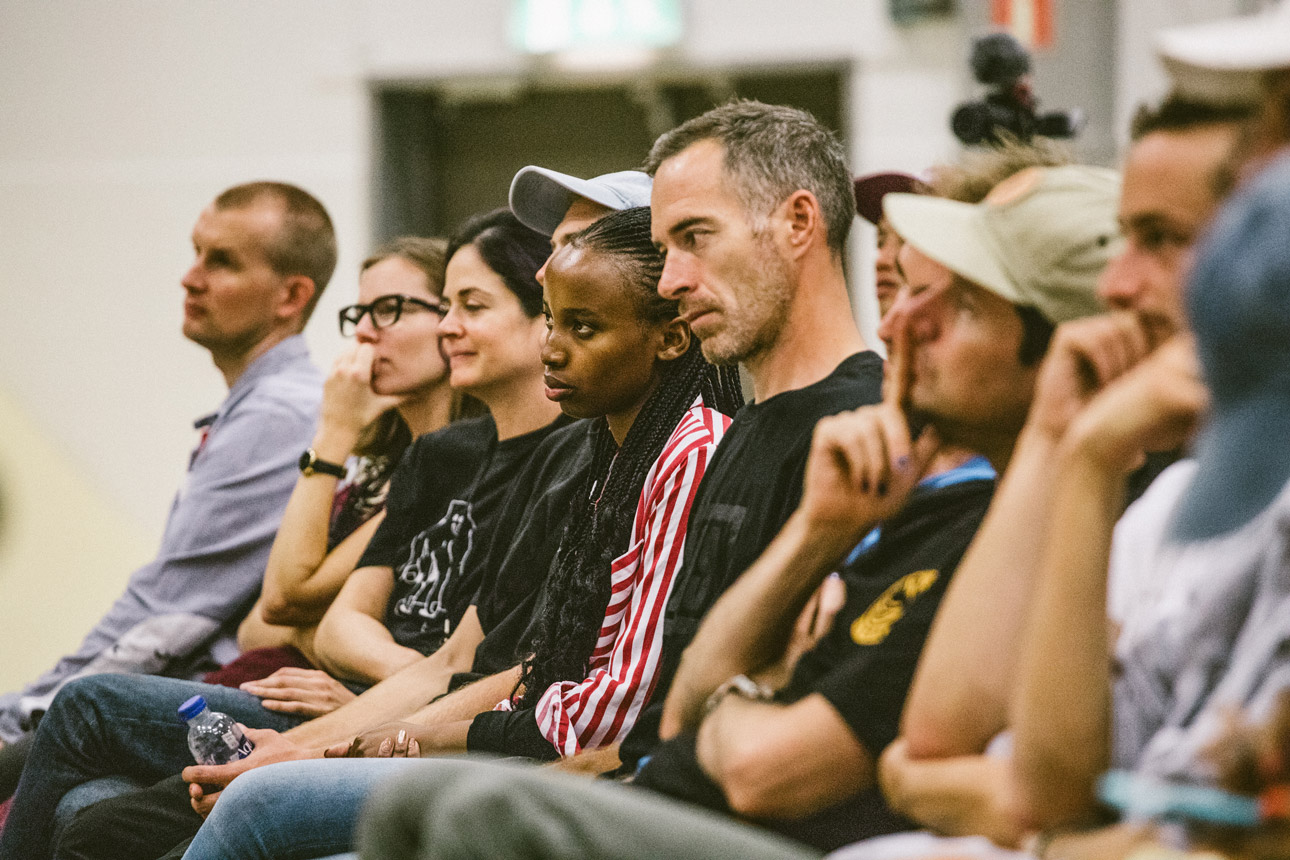
Katta Sterner from the Swedish Skateboard Federation and No Limit Skate, who attended Pushing Boarders with friends, offers much needed insight. She urges for “the macho culture in skateboarding to open up. It’s important to have safe places where you feel comfortable to talk to your homies”. In her view, “guys need to start talking. And in Sweden a great inspiration is at Guy Talk”. Katta also describes a skate tour with (cis and heterosexual) men where “magic happened in the tour bus — one of them opened up and talked about his mental health and how he had a ‘mountain to climb’ and then the rest did the same”. One of them “ended up getting professional help. So when one of your homies opens up, there will be more who do the same. It’s a start”.
We can all activate moments of change regardless of gender, age, ethnicity, education, occupation, faith or any other background. Even the act of sharing when we are struggling is part of that change. Studies suggest individuals at crisis point who talk to someone about suicide are more likely to change their mind (see the Mental Elf’s — AKA Dr Pooky Knightsmith — overview here based on a meta-analysis by researchers). Numerous suicide prevention services also propose that asking someone you feel concerned about “are thinking about taking your life?” does not ‘plant the idea’ in their head. It gives individuals an opportunity to talk to someone willing to listen (we have put easy to use resources at the end of this article on what to do if you need help or want to help someone).
Pushing Boarders actively encouraged its panelists to talk about mental health. As Ted Schmitz in Thrasher, Adam Abada in Quarter Snacks and Tobias Coughlin-Bogue in Skateism all pointed out, having well-known skaters talking about ‘real stuff’ is an invaluable way to spark more conversations. In You Can Talk to Me in the first session, former professional skaters John Rattray and Madeleine Uggla shared deeply personal experiences on the topic of losing loved ones to suicide. John shared about losing his sister Katrina and Madeline talked about her boyfriend, skateboarder Johan Florell. Both speakers talked with love, yet also honestly about the struggles of those they lost and how they now navigate their worlds without them. John and Madeleine urge for the normalisation of talking about feelings, and doing away with the idea that to stay quiet is the natural default we must impose on ourselves so not to ‘burden’ others.
John and Madeleine explained their own individual processes that keep steering them through with a sense of purpose. This includes knowing what questions and things are sometimes OK to just let go and let be. Physical activity that is not skateboarding can also be the right path sometimes. Madeleine explained in the panel that doing art and yoga became her sanctuary and what she needed, and after a period of time, she was able to skate again. John’s story of grief and coping is also deep and non-linear. Part of his path includes raising funds for suicide prevention services and bringing awareness to innovative research at Johns Hopkins University into severe depression, both of which he details in his Why So Sad campaign. He also recently spoke on a panel ‘Skate with Intent to Change/Switch’ in Vancouver, Canada with another Pushing Boarders panelist Kristin Ebeling (The Revolution will not be Patronized and Bad Design is a Crime) and others who are part of a global movement in skateboarding to create positive change in their communities. The full list of speakers and link to a video of the panel can be found in an article by Jeff Thorburn at King Skate Magazine.
Katta Sterner feels that, “Madeleine Uggla who talked at Pushing Boarders about her boyfriend who lost his life to suicide sends out an important message about how we can’t see what mental health looks like and that we all need to talk more” and that we also “need to create safe spaces for different people to feel comfortable to open up… we need more skateboarders to tell their stories.” But as powerful as talking is, for some it can seem too hard, awkward, painful and traumatic. It takes careful planning and resources to create safe spaces, and this can be hard to ensure even at events where mental health is given priority.
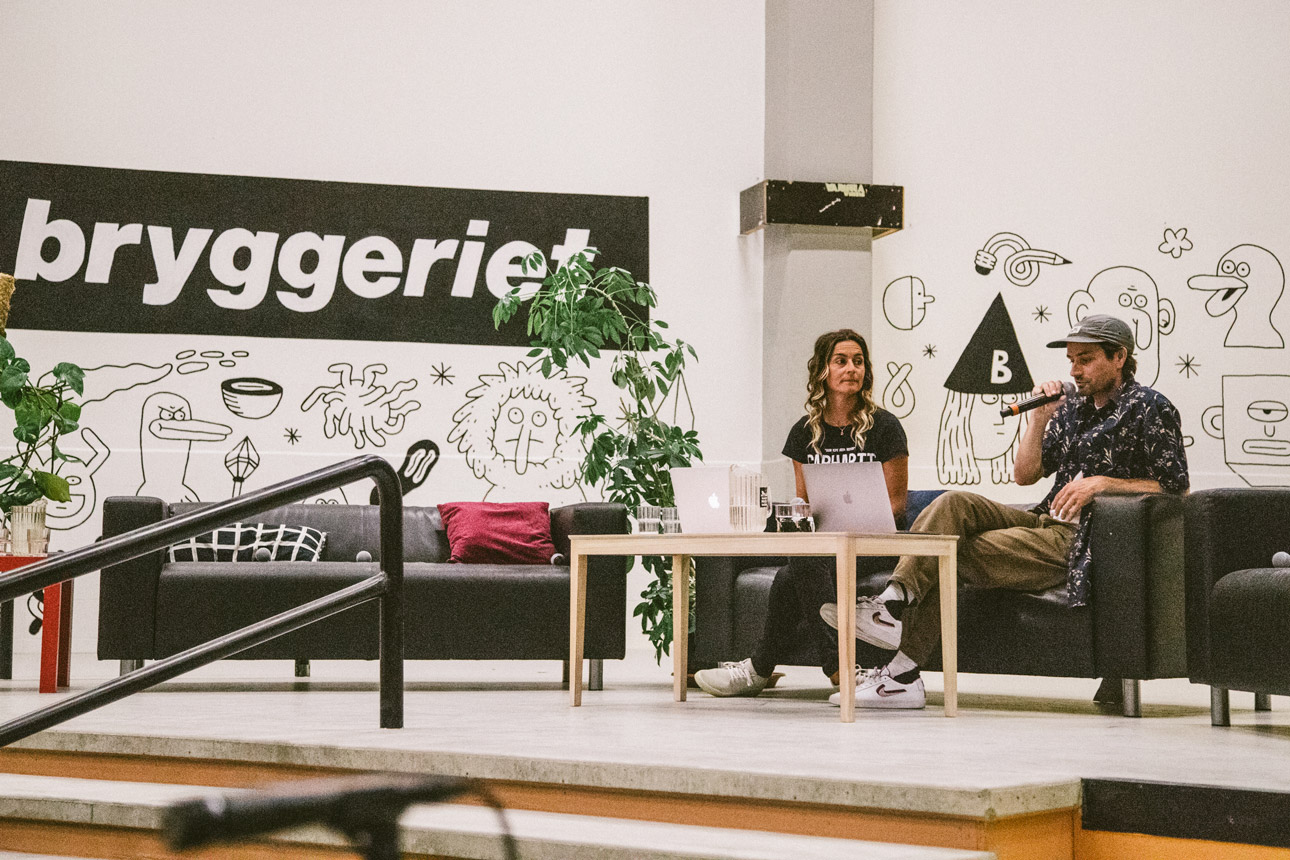
During Pushing Boarders a number of people talked about feeling vulnerable and fragile during the event. For instance, Imke Leerink looks calm and confident on stage talking about Girls Shred on the Tech will Save Us panel (chaired by Ted Barrow and also featuring Briana King). Yet off-stage and after the event when asked about if she ever struggled with mental health she explains that she is “going through a lot and in Mälmo at Pushing Boarders I wasn’t feeling like myself at all. Very insecure and shy and more in the background. It was really overwhelming, especially when not being in the best state mentally”. So while “it all was such a great experience, I’m glad I got to be a part of, it was also a big struggle for me mentally”.
The Pushing Boarders booklet has a review by an attendee who said it was “the best fucking conference I’ve ever been too”. But despite the rewards of attending, it is easy to forget how brave it is for some people to just turn up. There are big crowds, with a mix of people who set off all kinds of feelings in us. Having a sense of comfort can be fleeting. We can fan out and kick ourselves for it. We can become speechless. Or talk too much from nerves. Not everyone will be friendly, or at least friendly all the time (even if they want to be they may be shy, have jet lag, or stuff going on). There can be awkward encounters, misunderstandings and quick judgements. Things can be triggering. It can get lonely. And for those on the stage, it can be mentally and emotionally exposing. One of the positive ways to help people navigate an event like Pushing Boarders was shown by Kim Woozy, who held an impromptu Womxn’s Networking meeting. A special room was set aside and everyone stood in a circle, said their names, pronouns and what they were doing at the conference. The aim was to respect and connect in a specifically supportive environment.
Possible initiatives at future events might include a roaming ‘we care service’, where trained individuals act a bit like ‘tour guides’ but with an emphasis on offering checkpoints for mental health and well-being. Individuals in these roles are not counsellors but can do things like connecting people to resources or finding them a supportive and safe space. Event organisers can also create ‘pop up zones’ for people feeling shy, anxious, alone or overwhelmed. Activities in these zones might be a group meal, a skate session or even breathing and stretching exercises in the sun. We are all aware that not everyone has the same skills on a board and plan skate workshops accordingly. Similarly, socially conscious events can be aware not everyone has the same coping capacity socially and mentally when in big crowded spaces and be willing to help on that front. Debriefing for speakers would also be a constructive addition, even if informally checking in on those who spoke to see if they are in a good state of mind afterwards, and helping them through if they are not.
There are other options that we can also consider for skate events for those who are not up to talking or confident in crowds. This includes skater-led art initiatives, like the one shown in the documentary by Kelli Watson from We Can Fly in the UK. The Director Kelli Watson who, like many others in the audience at Pushing Boarders, was dedicated to normalising the topic of suicide and other issues of mental health, works with a wide range of artists. This includes some with lesser-heard perspectives on mental health such as Rae Smith from the Keep Pushing Podcast who also promotes the visibility, rights and voices of the Intersex community in skateboarding. Their focus on art and skateboarding inspired me, Evie Ryder and Tora Waldren as co-managers of Girls Skate Brisbane to now offer to run ‘chill zones’ at our events with art workshops done in collaboration with Lily Turek from Lil Grl Art. We also offer spaces where people who may struggle socially or just need a break can go and rest on picnic blankets and bean bags and do something like stretching classes.
The way we use skateboarding to connect can also be more in sync with how people feel. Nanja van Rijsse, head coach at Project Fearless in Amsterdam and co-founder of Womxn Skate the World states “In my opinion, this is what we need — we need people talking on their current problems, and more importantly, people listening actively” but for her personally, “skateboarding is perfect as it doesn’t require forced small talk, you can be alone in a group while focusing on something positive, while getting rid of endless overthinking”. So there is a need to be open to talking and listening but also being aware some people prefer silence and no distractions. Nanja draws on the wisdom of some of the kids she recently worked with, “the answer is quite simple: One – observe: Do you notice anything odd? Does the person say something that makes you feel that they are sad or not feeling well? Listen to what is said, listen to the tone of voice. Two – ask and listen: Ask if someone is OK. Also, ask if they want to talk about it, listen to their answer, respect the answer. And three – help out: See if there’s anything you can do, if you need to tell it to someone else who can help, or at least remember it to check up with them another time”. At the heart of these steps is that, “It is about increasing the quality of the conversation, without necessarily increasing the amount of talking”.
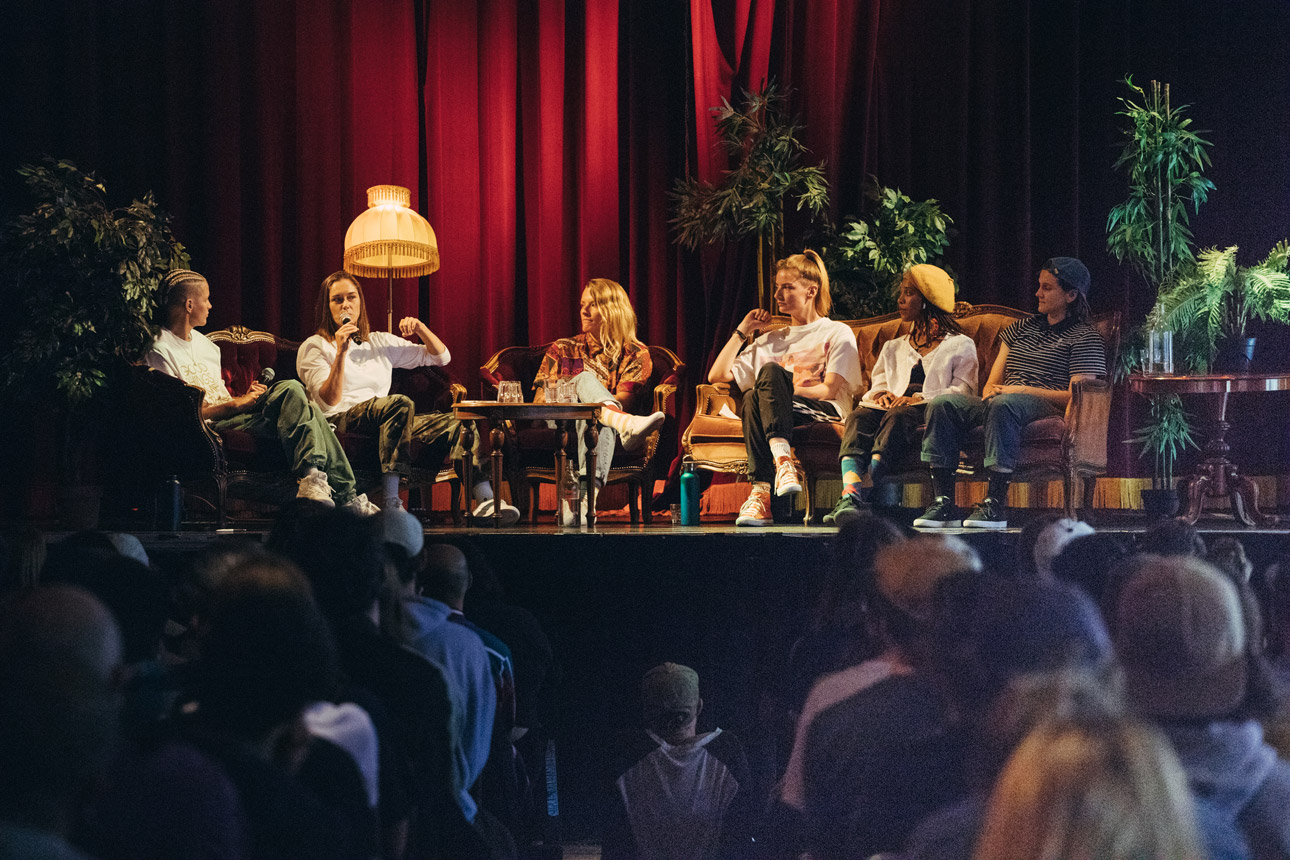
Moving from micro-level to macro-level things, urgent attention also needs to be given to the links between mental health and broader social inequalities. In the case of the LGBTIQA+ communities for example, there is the double ‘work’ of having to cope with things such as homophobic and transphobic attitudes in everyday life to also facing hostile legal, medical, insitutional and political processes that deny forms of safety, freedom and equality. Community groups focused on both services and advocacy can offer a very important bridge. High profile veteran skaters like Brian Anderson who is also one of the well-known men pro-skaters to be openly gay posted a sensitively crafted and loving tribute to his sister who lost her life to suicide when she was 18. Posts like his not only give space to individual experiences, they also create a path that can guide followers away from isolation by being directed towards activist organisations like The Trevor Project and BWT Foundation which focuses on shared and collective community experiences and resources.
Concerns of isolation were reflected in conversations at Pushing Boarders with attendee Enni Kalilainen who previously ran Tyttörullalautailijat Skate and has now launched Siblings Helsinki, both in Finland. She states, “My main interests have been making skateboarding more friendly and more open to womxn and cis-women. I want to make life easier for my younger and older ‘siblings’ by trying to make social spaces reachable in a society that can help us grow, where one’s worries are eased”. But she also shares that “to be honest it’s been lonely and stressful work because of my country and internalised attitudes like transphobia and cis-sexism. As a Trans women it is so difficult to get allies and spokespersons to stand with you when you need help the most”. However, Enni also describes how, for her, being able to connect with others on social media and also travel has been a way to “get to know the wonderful womxn skaters and other people all around the world”. Dr Esther Sayers, a panelist from Skate and Educate: From Classrooms to Community panel adds, “We have a long way to go before the skateboarding world is fully integrated with womxn, queer skaters and a range of ethnicities, not to mention the often unseen adaptive skateboarders. What I see in skateparks is a much, much better mix of people than I see represented in skate media”.
Kava Garcia Vasquez, a presenter at the Academic Forum and panelist on The Revolution Will Not Be Patronized who identifies as Queer argues in depth in Skateism how discrimination based on gender and sexuality are key issues, and that the most marginalised populations can lack solid allyship, support and representation. Pushing Boarders set out to be inclusive of LGBTIQA+, womxn, gender queer and non-binary skaters (with Leo Baker, Briana King and all the Rage Against the Gaze speakers contributing to one of the most powerful panels) but needs to be careful about tokenism. Relying on one minority to speak for a whole community is problematic for many reasons. One example was the lack of trans skaters in the speaker line up in the absence of Cher Strauberry who was unable to attend, a point made by Tara Porter of Neighbour Skateboarding in our Part 1 article.
Racism, who speaks about it, and who is remaining silent, also cannot be separated from issues of mental health. Kava’s reflection piece in Skateism as a Dominican-American, DominicanYork, Afro-Latinx from the Bronx (whose parents are from the Dominican Republic) detailed how the absence of Beatrice Domond sparked serious reflection at Pushing Boarders about the lack of Black speakers and tokenism. Kava points to how complex issues of racism should not rest on non-whites to carry alone as if issues of intersectionality do not involve whites. At events dedicated to diversity and inclusion, people of colour should not just be invited to speak about the topic of racism. Panels dedicated to diversity should go beyond token efforts to include people of colour (I recommend listening to an interview led by Heavy Discussion for the Quell Skate podcast). Pushing Boarders also acknowledged their limits from having a team made up of mostly cis white men, with organisers such as Thom Callan-Riley and Chris Lawton being quick to acknowledge oversights on race and gender prior to The Revolution will not be Patronized panel and after the Spaces workshop at the conference.
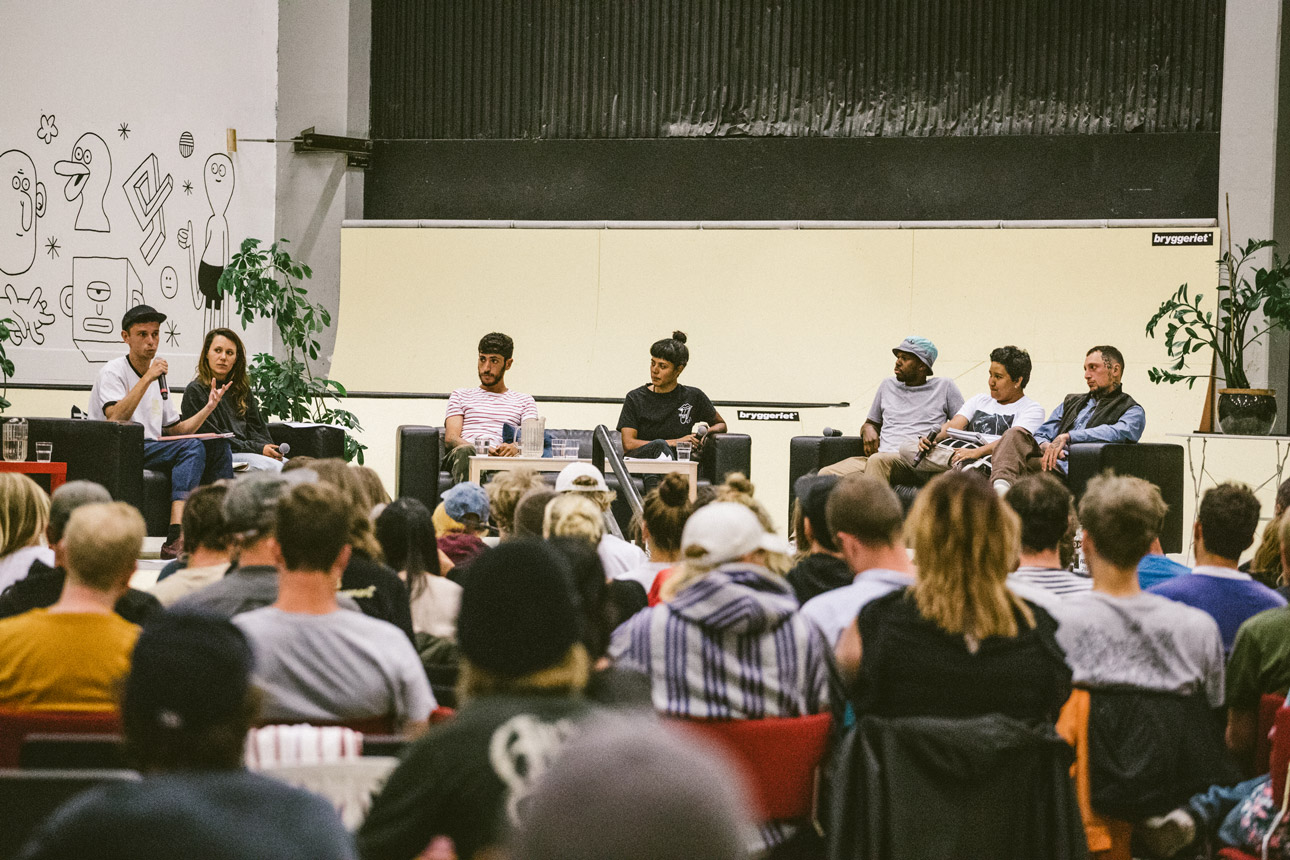
Voices outside North America and Europe are a vital part of addressing mental health and understanding the more inner world of skateboarders in our current era. This is especially important as skate development projects are rapidly being rolled out globally. At Pushing Boarders The Globally Stoked panel stood as a refreshing source of knowledge and expertise. Leyla G Leon from Concrete Jungle Foundation in Peru, Atita Verghese from Girls Skate India plus Ayanda Mnyandu from Skateistan, South Africa, Aram Sabbah from Skate Pal, Palestine (and chairs Will Ascott & Ruby Mateja) provided local points of view from places where skateboarding is comparatively new. Skateboarding in such areas that can be highly under-resourced due to uneven economic forces, conflicts, militarism and colonialism. A big emphasis was on the need for locals to get into management roles and ensuring relationships between them, volunteers and visitors is one of mutual respect rather than saviour complexes. Missing voices on efforts to decolonise skateboarding warranting attention at future events include those belonging to First Nations skaters from places like North America, Australia and New Zealand.
Kava also wrote in Skateism about unseen heavy burdens that both locals and non-locals collaborating on skate development projects can carry, “I think of my late friend Isard Pindula, founder of Skate Mozambique, who took his own life on 9 July 2019. I honor Isard along with other beloved individuals who dedicated their lives to spreading their love of skateboarding”. Kava continues, “As we heal through these losses, we must consider the following questions: How does working in conflict zones such as Israel/Palestine, or with traumatized refugee youth in Athens and Amman, affect both the youth and the skateboarders who seek to heal and connect? Who heals the healer? In a culture that celebrates individuality, recklessness, and escapism, how can we evolve beyond the “pick themselves up by the bootstraps” mentality so that people don’t feel pressured to mask their pain and heal in isolation?”
Staff on the frontlines of skate projects are regularly playing the role of witness, confidant and comforter to people carrying immense trauma. Calls for support to do this work were made clear at Pushing Boarders when Amber Edmondson from Womxn Skate the World opened up about her own struggle with mental health when speaking about her work with refugees in Athens, Greece with Free Movement Skateboarding. At the end of the womxn’s panel Amber referred to mental health issues as part of the ‘darker side’ of skate work. While not being a refugee, nor wanting to compare her experience to theirs, she openly expressed on the panel, “It is really hard – and if we’re in a space here where we’re saying we all need to be talking about it and we all need to ask for help when we need it – I am struggling and I do need help and so do my staff”.
An article by Ruby Mateja, also in the same organisation, expanded the often unrecognised and unsupported weight that skate-development and community workers (local and non-local) silently end up carrying. As Ruby emphasises, “we are all totally invested in what we do, with little/no external support, trying to make our work emotionally and practically sustainable, but oftentimes struggling to do so”. The challenge, as Ruby explains, is to find the right kind of support to consider “how to make this work emotionally sustainable for the people who put their whole being into establishing projects that they feel have a positive impact on many people’s lives”.
Post-conference, Sophie Friedel who volunteered in Afghanistan and is the author of The Art of Living Sideways and was on The University of Skate panel holds similar concerns. She explains she is now, “exploring how the Skateboard Therapy that I have been running in Germany can be implemented with skate philanthropy projects around the world. Dealing with trauma is a sensitive subject and I feel we need more practitioners in the skateboarding community that know how to handle trauma skilfully”.
Journalism and reportage beyond skateboarding also emphasises similar risks when working with vulnerable populations, such as in The Guardian and The Humanitarian Advisory Group. The key advice is that no one should decide to cope alone or feel guilty fom comparing their lives with clients, they should take time for debriefing, and have supervisors monitor the hours staff spend ‘on’ and ‘off’ duty (because aid workers feel guilty having down time). Norma Ibarra, a photographer with Skate Witches, UCanSkate and on many overseas assignments in places like Cuba, was on the Editor’s Note: Brutally Honest Skate Journalism panel and agrees skate professionals need to be more attentive to their “mental hygiene”. She urges that “There are a lot of things that need to be taken care of and if we all contribute with our knowledge and strengths united we can create a bigger impact”. This includes recognising that we have an incredible resource pool in the skateboarding community, and need to start finding out where we all are and what we can do.
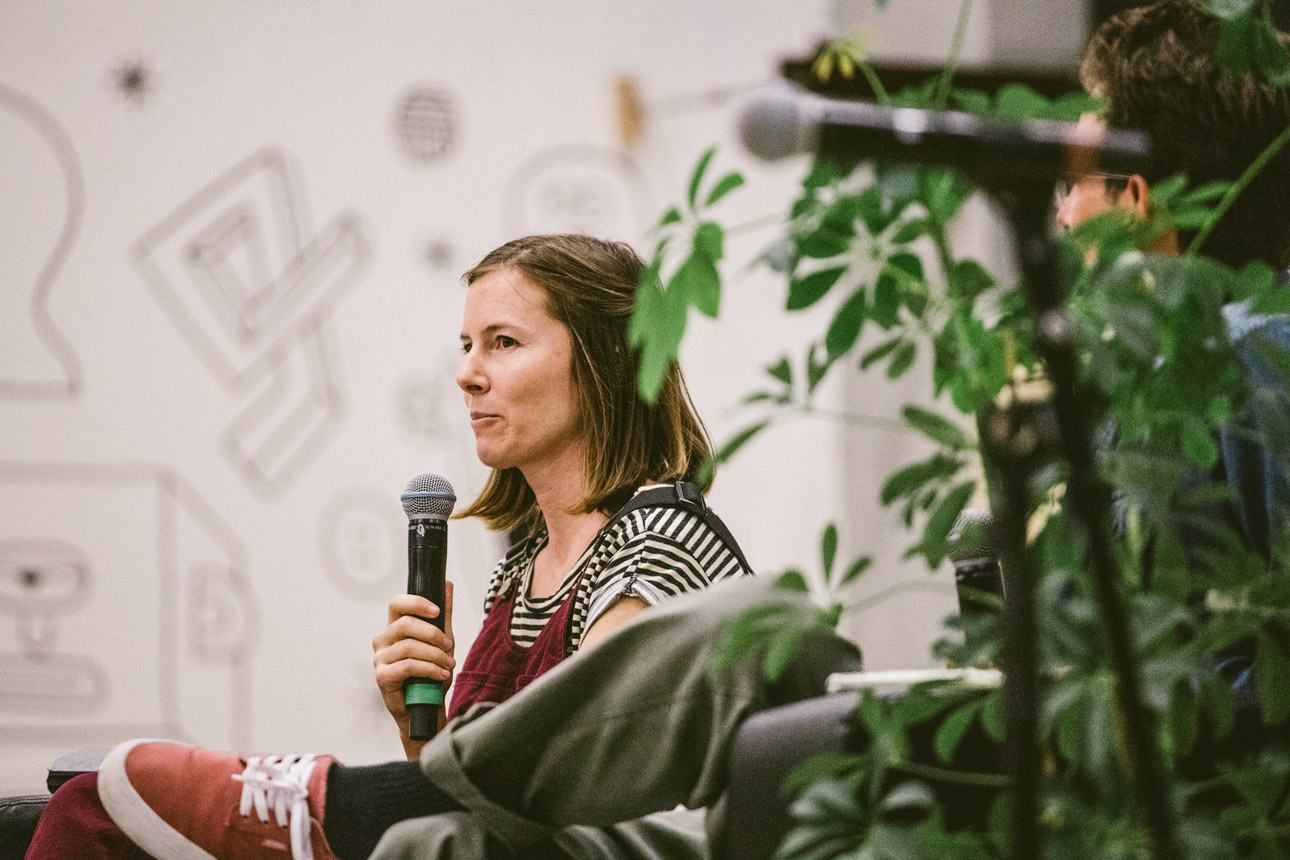
Skateistan, through Goodpush Alliance — steered by Rhianon Bader who was one of the Skate and Educate panelists — recently ran a large-scale survey of 100+ skate organisations in 2019 that will no doubt give important insights into how things are running and how they can improve once the results are released in early 2020. There is also a summary of their event that had a strong focus on mental health held immediately after Pushing Boarders at Alis Wonderland bowl in Christiania, Copenhagen. Speakers included Skateistan’s South Africa Educator Wendy Ngwenya who presented on challenges faced in Johannesburg and facilitated a group brainstorming workshop on challenges for social skateboarding projects, in which burn-out and mental health of workers were prominent topics.
“Those who work with vulnerable populations… may be more susceptible to minimising their own needs in light of the immense hardships faced by the people they serve.”
Other under-recognised populations who feel they need to ‘keep a brave face’ and bury their feelings and mental health issues are community workers who are also researchers, and educators. While not always on the frontline, many are still repeatedly exposed to highly traumatic stories and content. Cayla Delardi, a 26 years old Master’s student at NYU who attended Pushing Boaders states, “we definitely need to be mindful of our capacity for emotional caretaking to prevent burn out, but taking an active role in facilitating social support networks should benefit ourselves just as much as others.” Aware this is easier said than done, she also adds, “I think it’s important for everyone to practice self-care, but particularly those who work with vulnerable populations and may be more susceptible to minimising their own needs in light of the immense hardships faced by the people they serve”.
There is a need to break the myth that skaters in these professions can remain neutral and unaffected observers. Panelist Dr Jessica Forsyth from the Skate and Educate panel for instance states, “after a stretch of feeling really isolated and burnt out, which is often a side-effect of working in non-profit community work, I came away feeling like I’m not alone in the work I do”. Cayla’s own current research explores some of the big challenges womxn and non-binary folks face as they carve a space for themselves within skateboarding culture. She states, “I was so happy to see an emphasis on mental health at this year’s conference… I’ve been living with an anxiety disorder for a long time and while I’m open about it now, it took me years to be comfortable enough to share that part of myself without fearing that people would think less of me for it or caring if they do”.
In our current era more and more skateboarders are becoming familiar with and open to discussing problems related to anxiety, low self-esteem, OCD, bi-polar, PTSD and forms of depression. These are just some of the mental health issues that are increasingly easier to read about and find professional help for online or offline. Cayla feels, “Destigmatising mental health is a huge task that doesn’t end with us, but it can certainly start within the skateparks, spots, social media platforms and forums that constitute our local and virtual communities”.
Skateboarders also tend to ‘play it cool’. Despite having crews, skateboarding is still an individualistic pursuit, not a team one, and typically attracts people who are not afraid of going it alone. At best, skateboarders are highly self-reliant, tough and remarkably resilient physically. But our instincts and habits to do things independently, with a high threshold for pain, can also overlap into habitually facing things alone and carrying far too much internal weight before stopping to acknowledge what’s going on and to rest, reach out and repair. As Dr Esther Sayers from the Skate and Educate panel proposes, “not even pro skateboarders see themselves as ‘just’ skateboarders. We are all multi-dimensional human beings with many interests and aptitudes. Somehow, we need to get better at helping ourselves and others to apply the skills gained in skating to the skills required in other aspects of life”.
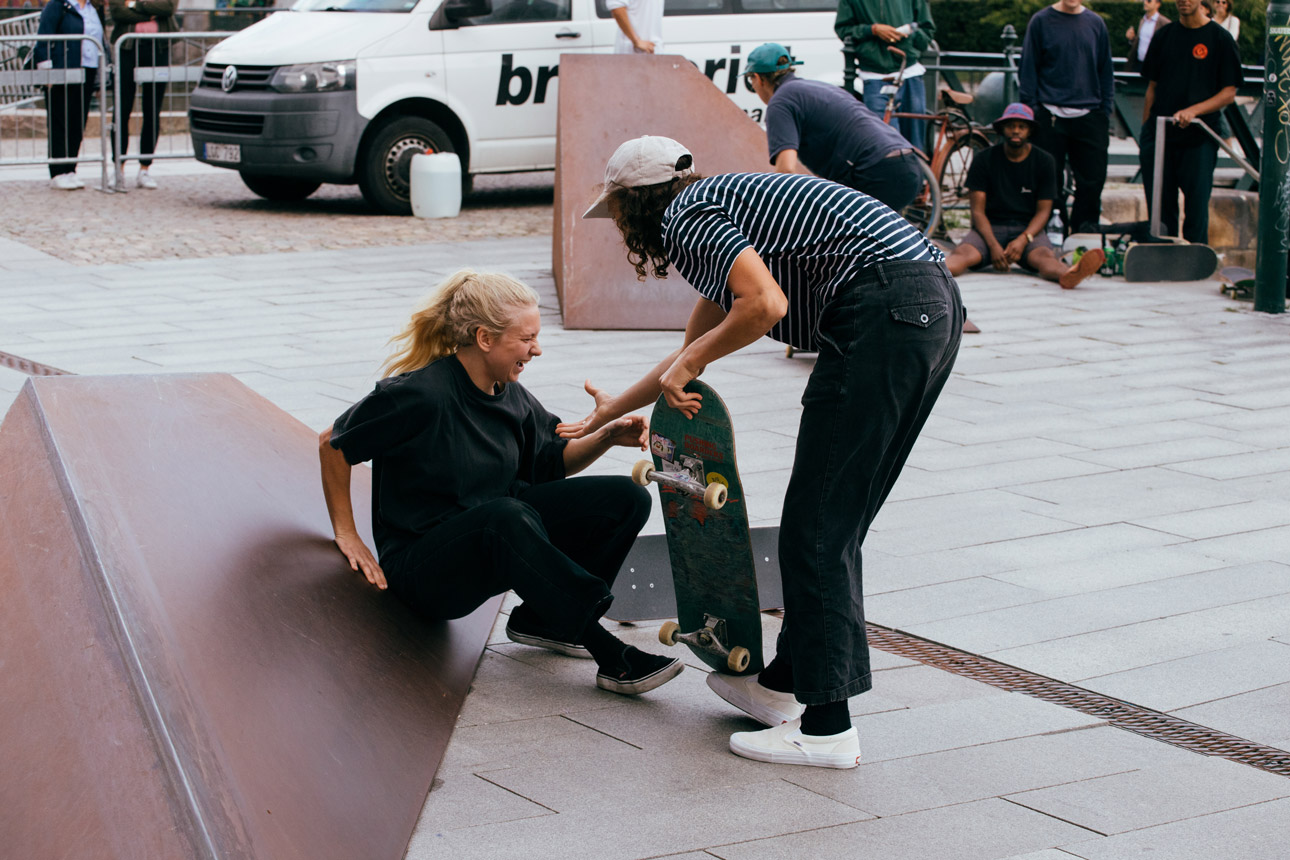
The ‘putting up with’ rather than getting honest about our mental health is echoed in the reflections of Helena Long, a musician, sponsored skater with Poetic Collective, and a welcoming and thoughtful presence in the UK scene. Helena always has good energy to share with others, but when reflecting on her own mental health and need to talk she said, “I never did and rarely do about those kind of things and it’s not somewhere you can easily escape from on your own”. She perceptively adds that when we do try to help each other, we need to “pay closer attention to each other and the effects of what we might be saying or the way we are acting to one another. Sometimes we may not be asking the right questions and could spend more time really listening to each other”.
Claire Alleaume from the Editor’s Note panel has been a sponsored skater, a writer for many years and recently launched Two Set Magazine to further conversations in skating. On the topic of mental health she states, “I can’t pretend to be the best giver of advice as I myself would like to know how to help better”. But “what I have personally found helpful is friends taking the time to have a proper chat. Exchanging messages can be great but sitting down and having a proper, candid conversation where you can vocalise your thoughts — that’s lifted me in times when I really needed it. Also realising that helping friends when they are going through a tough time is not easy — sometimes it’s hard to stay by someone’s side when you feel they are not ‘being nice’ or ‘helping themselves’, but this can be when they need the most support”. And at the personal level she states, “Skateboarding certainly isn’t always the answer, but I know the primal, euphoric feeling of bombing a hill with friends has helped me before”.
Another positive thing we can do is lead by example by talking openly to younger skaters. Professional skater and The Revolution will not be Patronized panelist Candy Jacobs tells how, “I think everyone in their life comes across moments when their mental health needs a little bit of extra attention… I also speak with young children in the skatepark about mental health and be as open as I can be to the questions they might have’.’ She also discusses how she has also, “needed someone to guide me a little bit more throughout my journey as a professional skateboarder and the life changes I was making. I got in contact with a mental coach — it goes further than just skateboarding. I feel comfortable talking about anything that I feel needs to be addressed”. In her experience, “That would be my advice I guess, find someone who you can speak openly to about whatever you’re going through, take small steps until you feel comfortable. I use my skateboard as a tool for my unrest but need other people around to maintain my mental health as well”.
Event volunteer Joana Fongern who is also a designer of street-wear brand Nayf and Wavey feels that in “the skateboard industry where you (still!) have to be the strong, not-caring, emotionless skater dude that can’t show feelings, it is important to be there and let them know that it’s okay to cry and feel emotions”. On the flipside of the coin, Dr Adelina Ong spoke critically in The University of Skate panel about a side of the well-being industry that encourages vulnerabilities for financial exploitation. She strips away the romanticism and mysticism around many ‘wellbeing’ and ‘self care’ movements by highlighting that they constitute a multi-million dollar industry. Moreover, Adelina criticised “that much of self-care is not care at all but an attempt to keep the workforce going”. Nanja van Rijsse offers three useful tips that can be adapted for anyone from mental health advice she was given: firstly, make time regularly to do something with structure, secondly, do something fun, and thirdly, also make time to do nothing.
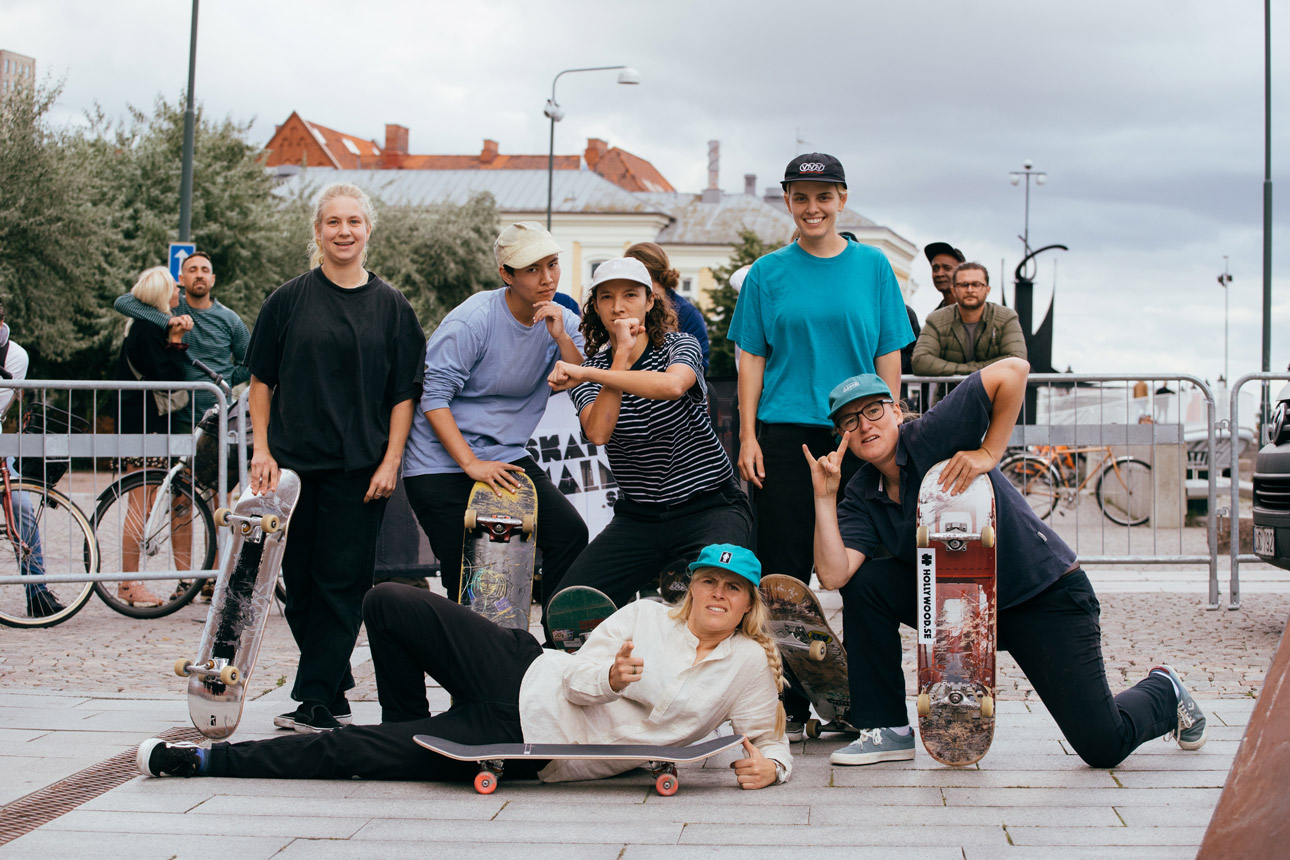
Skateboarding can offer us a sense of fun, freedom, joy, self-expression, achievement and place to temporarily suspend our worries and take sanctuary in. It can also improve our mental health and well-being. But it can also be stripped away from what makes it a meaningful and positive activity and lifestyle, especially for those on the margins. This is especially so when it is tightly packaged in all kinds of gate-keeping and narrow ideas of how we should act, and who for? Globally, there has been a steady increase of diversity at many skate parks, skate spots, in skate media and at skate events, including more WCMX, adaptive skating, and womxn, non-binary and Queer skaters. However, most scenes still have a hefty bro-ratio.
There are many guys in crews, at skate shops, skate journalists and so on being supportive, respectful and giving space for everyone to do their thing. But there are also some who continue to gate-keep. Unintended micro-incidents include when guys dominate the skatepark without leaving much chance for anyone else to get a line or have a go, making it stressful to learn. Rachael Sherlock, a filmmaker and skater who has been instrumental in promoting womxn skaters in the UK with Rogue Skateboards also explains that, “sometimes other skaters are in their own world skating and don’t realise you’re not confident, and some skaters are just dicks”. More seriously, gender queer, trans, non-binary and Queer skaters have the invisible burden of having to assess if where they want to skate is going to be safe for them. That means somewhere where they are less likely to encounter homophobic or transphobic attitudes and can avoid being vibed out, verbally abused or physically threatened.
“Sometimes other skaters are in their own world skating… and some skaters are just dicks.”
In terms of identifying as ‘just’ skateboarders, many of the womxn and non-binary skaters who were at Pushing Boarders also reveal that imposter syndrome can be a real issue. Reflecting on her experiences in the Melbourne skate scene in Australia, Kirby Clark from Decks for Change states, “I have always felt like I am not entitled to take up space in skateboarding, at the skatepark, skate shops, at prems. There’s always a little voice that says ‘you don’t belong here’”. Things that can help includes seeing people you do identify with taking up space. During Pushing Boarders she recalls, “There was a moment where I was sitting with my friends, seeing a bunch of ‘non-traditional’ skaters around me, and I just lifted my posture a little and realised I felt so relaxed and okay to take up this space”. But she also adds, “If I, — a cis, white, straight presenting female — can feel so out of place in these spaces, I want to make sure I’m being more mindful of how other people feel in these spaces and what I can do (or not do) to help them feel like this is their space too”.
Things were not always easy for Kat Sy either. She recalls, “When I was younger I would definitely go to the skatepark with a chip on my shoulder thinking that I had something to prove being the only girl skater there and feeling like I was representing all women”. However over time her perspective shifted. She states, “I think what helped me grow out of that is realizing that skateboarding isn’t about how ‘good’ you are. Nobody cares about how good you are. Skateboarding is about you pushing yourself. Nobody can skate for you and you can’t skate for anybody else”. Another good piece of advice on how we all deserve to skate ‘as us’ (being ourselves) and ‘for us’ (not trying to impress or fit in with anyone else) is offered by Helena Long. She states, “Do your thing. There’s always a space for everyone. The more visibility, the more others can relate and equally find the confidence to be proud of who they are. Don’t be afraid to skate with the ‘guys’ and to integrate yourselves within the wider community”. She also argues, “if you do come across those who are ignorant enough not to welcome you, just remember that they are the ones who don’t belong in this community, not you”.
Kim Butter from Womxn Skate the World also urges us to think about larger social problems that find expression in skateboarding. Drawing our attention to the official program of Pushing Boarders, she reminds us how it stated that “Whilst sexism, racism, homophobia, transphobia and xenophobia are expressly prohibited, we also strive to ensure that everyone can participate free from discrimination and feel valued and included within the culture of skateboarding. If you are someone who enjoys privilege of any kind within skateboarding, understand that not everyone does, and use it to bring those people in”.
For Kim, the culture of skateboarding is interconnected with a wider process of symbolic violence that positions anyone who is different to the mainstream as inferior. She also points to how we can all play a role in checking prejudices and bias as, “this dominant group is not some evil group of men that are purposely manipulating and dominating the whole skatescene. Most of this happens unconsciously. And also, because this discourse is so embedded in the whole scene — minorities contribute to this as well. That’s why it’s important to realise when and how it happens”. Kelli Watson also explains that after watching the Globally Stoked panel, “I am more aware of issues that women and children are facing in other countries (such as South Africa and the Middle East) … The Western view is very much focused on empowerment and I think we should be more aware of the power that we already have compared to some women and how the sense of empowerment means different things for women from other culture”.
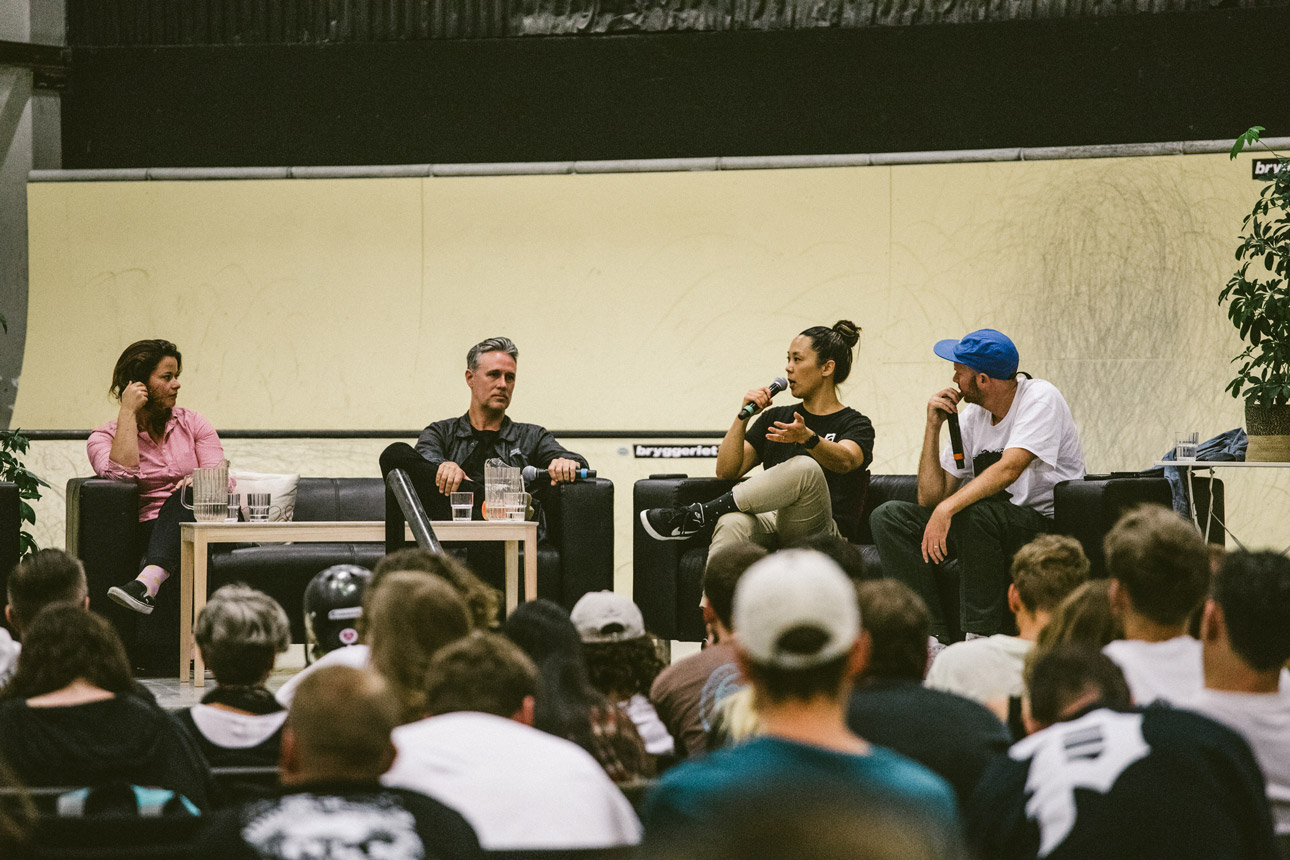
Mentors can play a particularly positive role in skateboarding. Kim Woozy, who was on the Stay Core, Stay Poor panel, discussed how, “Mentoring others is such a fulfilling way to live life, both as the mentor and the mentee. I think effective mentorship is about providing guidance and knowledge and sharing experience without suppressing innovation or new ideas — allowing for each other to create our own version of culture and what rings true to ourselves”. She also explains how she “loved the idea (raised by academic panellist Dr Adelina Ong) of having a youth mentor. I realise I have a few but I loved having a term for it!” She also emphasizes that men can also benefit from mentoring. She states, “A question that Kyle Beachy (Stay Core, Stay Poor chair, academic, writer and Vent City podcast team) had on his list that we didn’t have time to get to on our panel was regarding mentorship. He noticed that many of us (womxn/non-binary) folks in the skate community brought up how we had mentors and mentored others. He was curious if this is a concept that could be applied to men and the dominant culture/community. My answer is 100% absolutey hell yes!”
There are many professional roles where mentoring for and by womxn and non-binary skaters is also valued, even if that is just giving others a sense of community. This includes photographers at Pushing Boarders such as Emanuele Barbier from France, who is one of the skaters in the Gucci Grip ad series featuring communities of skaters from around the world; Hannah Bailey from the U.K. (who was a co-chair for the Editor’s Note panel with Anthony Pappalardo); and Norma Ibarra, who calls herself a ‘Mexi-canadian’ with Mexican and Canadian ties. Mentorship in these types of jobs offers technical insights but is also socially and mentally rewarding. Norma states that, “In my career as a skate photographer sometimes I feel I have been judged by my looks, or my level of skating but not really by my actual photography work. It’s been hard or sad but I have stayed strong and am still pushing to break the barriers”. She reveals that “Luckily I have had amazing mentors who have helped me to get where I am at. This is why to me inclusion, collaboration and education in skateboarding are really important”.
Emanuele, who identifies as non-binary, also highlights how an openness to let people we have never met before, or just have seen around, share some time and thoughts with us can make a huge difference. They state, “My best memory from Pushing Boarders was during dinner with complete strangers. Some people I had met an hour prior invited me to the restaurant. We were all from different backgrounds. Yet we all got along pretty quickly over our meal, enough to feel comfortable sharing some of our deepest traumas and fears”. The reason this can work, they offer, is that a shared passion for skateboarding helps create a safe space, free of judgments, of prejudices, of stigmas. “That was my most memorable time in Malmo. It just showed how great the community can be.”
Many other skaters shared how they do not feel like rolling amongst the crowds at skateparks due to feelings of loneliness, feeling uncool and awkwardness. But it is easy to forget that the most confident skaters have often taken years finding their way in skateboarding. This includes Mimi Knoop, a panelist who is a veteran of the womxn’s skateboarding competition scene, ran a womxn’s skateboarding team with Hoopla and continues to break down barriers through the Women’s Skateboarding Alliance. She comments that, “I struggle all the time! I am still trying to figure out how to be cool”. But those feelings can oscillate and become less prominent. She explains, “At a certain point, you just stop caring as much because it’s exhausting to try and keep up with the cool factor. My advice would be to focus on having fun and being yourself, and be sure to always keep good-hearted, authentic people in your corner”.
Concrete Jungle Foundation skater and panelist Leyla G. Leon, who everyone at Pushing Boarders would agree definitely is cool in the best ways possible, shares similar advice, “When I started skateboarding, I always wanted to have the latest things to look cool, but over time you realise that it is not about that. Personally I learned that it was progress, resilience, sharing and having fun”. Imke Leerink also describes how “There’s lots of pressure in skating to look cool, confident and in control all the time. I was a very shy, insecure young womxn when I first started skateboarding but once I started, I did get more confidence and the feeling of being able to be myself”.
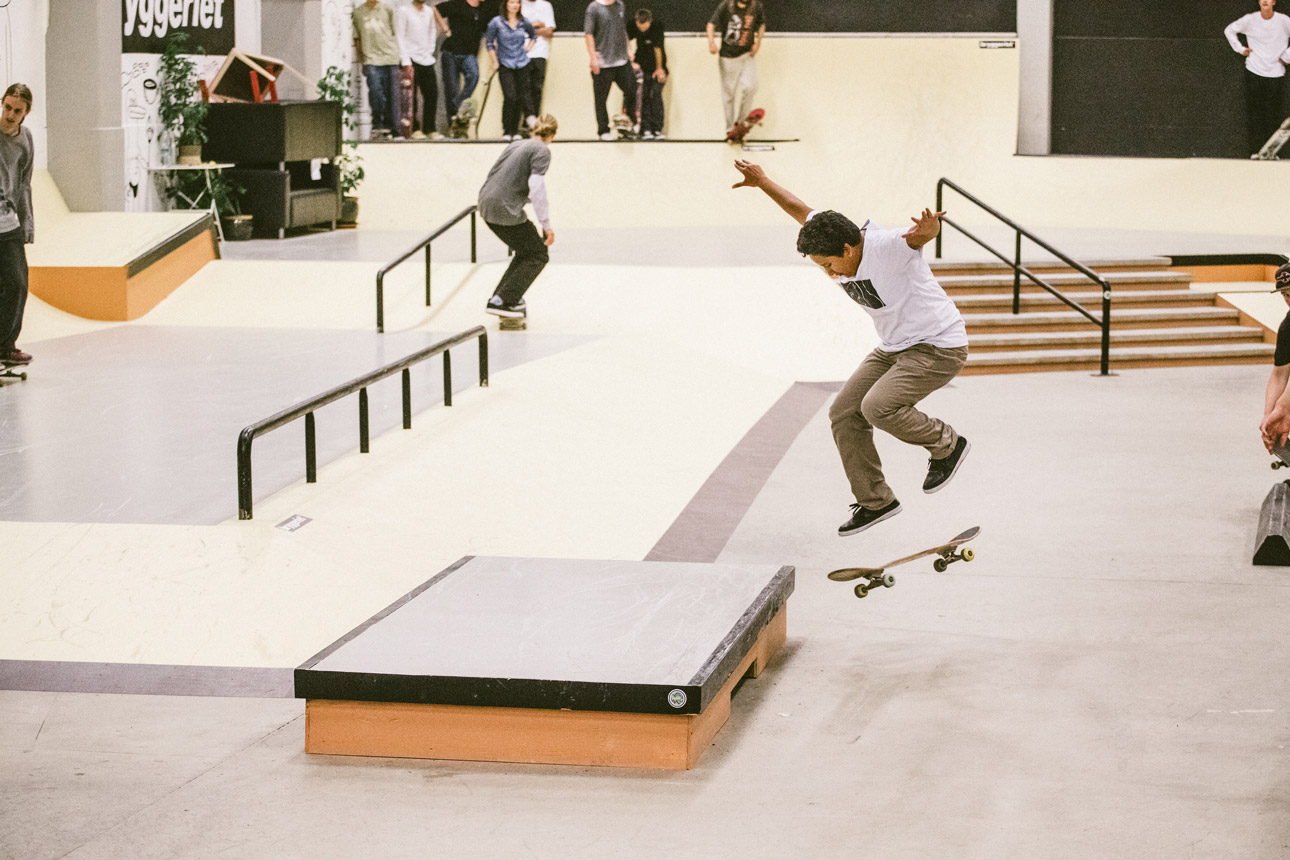
Skate researcher Beatrice Hallman from the Academic Forum also feels that, “having anxiety about not fitting in, being a womxn skateboarding… has become a lot easier to handle and overcome with age. But with age comes other issues and norms that I have to work through”. Dr Esther Sayers, who is in her late 40s, also commented on age, stating “Recognise the confidence that comes with age and be sure to give extra room to youngsters in the skatepark to do it their way and for them to have ownership of the space. Be more mindful of the barriers that all people can face in one way or another when approaching the coded and loaded space of the skatepark”.
Like me and a number of other ‘mums who skate’ at Pushing Boarders Esther also started skateboarding in her late 40s and believes there are many benefits it can bring to individuals who are older and who may be parents. She states, “Skateboarding has given me meaning, a purpose, connected me to the present. Children exist in the ‘now’, adults are often preoccupied with remembering the past or planning for the future”. Esther highlights that, “For children, it is normal to learn new skills, for an adult, taking on new things, especially ones that could cause injury, is unusual” and that “society does not accept risk taking in older people as readily as in those who are younger”. She observes, “risk taking in older adults is often labelled ‘crisis’ or ‘irresponsible’, seen as a rupture in the status quo, something that has gone wrong”. She also offers a refreshing and positive window around skating at any age stating, “Through skateboarding we resemble the child at play again. In this place, where we are excited to find new games to play or finding new ways to look at things, you have to override the urge for self preservation and overcome fear. Affirming life. Creating our own values”.
In creating our own values, we also need to start drawing on our own ideas about what we think ‘counts’ as good, worthy and ‘lit’ in skateboarding. Skaters tend to have a habit of measuring everyone against a standard of skateboarding that is suited to some bodies, but not suitable for every body. For example, expecting a 21 year old beginner to skate like a 16 year old who has been hitting skateparks with their parents since they were 6 and just secured their first sponsor. Or comparing the progress of skaters who are adults, or parents, and who balance family, work and only get to skate 2–4 hours a week to a 14 year old who spends 4–6 hours a day skating. Or perpetuating a type of gate-keeping focused on having to perform conventional trick lists before being able to bring fresh ideas, energy, friendships, support, collaborations, filming, photography, art, writing, research, networks, community building, events skills, funding knowledge and more to the skate scene.
Doubting our own abilities and having anxieties that can stop us rolling can even affect some of the most hard working, determined and biggest game changers in skateboarding. Kim Woozy for instance states, “I didn’t skate for practically a decade (the time I worked at Osiris and after) because I was worried about judgement and sucking!” One of the issues, in her experience, was that, “Pretty much everyone I knew that skateboarded was a pro skater so there was no relatability”. What changed however was when she “realised if I just started skating and gave up all the concern of looking cool and being good, I could’ve actually gotten better and been having fun the whole time!” Even skaters who compete in and coach skateboarding as professionals can feel self-doubt. Leyla G. Leon advises competitive skaters that, “In the moments of the championships one always feels pressure, my advice is to take a breath and do what one knows how to do and above all enjoy it”.
Researchers in skateboarding can also experience self-doubts, despite providing fresh angles for viewing how we roll, perform, experiment with and embody the identities of skaters. Dr Dani Abulhawa describes how, “I find the sight of a crusty DIY spot both seductive and anxiety-inducing [laughs]”. One of the issues, in her view is that, “I always struggle at any spot because I feel I’m just not going to be able to do much. To some extent, I’m comfortable with this and I always have to keep my negative thoughts in check because I can sometimes get into blaming the spot or the park for not being very good, when actually it’s sometimes just that I am… not creative enough with what I’ve got, and ultimately that I don’t work hard enough to overcome my fear”. By emphasising the creative possibilities, she offers an alternative to the idea that one is ‘not very good’ because they cannot mimic conventional ways to hit an obstacle or express themselves on a skateboard.
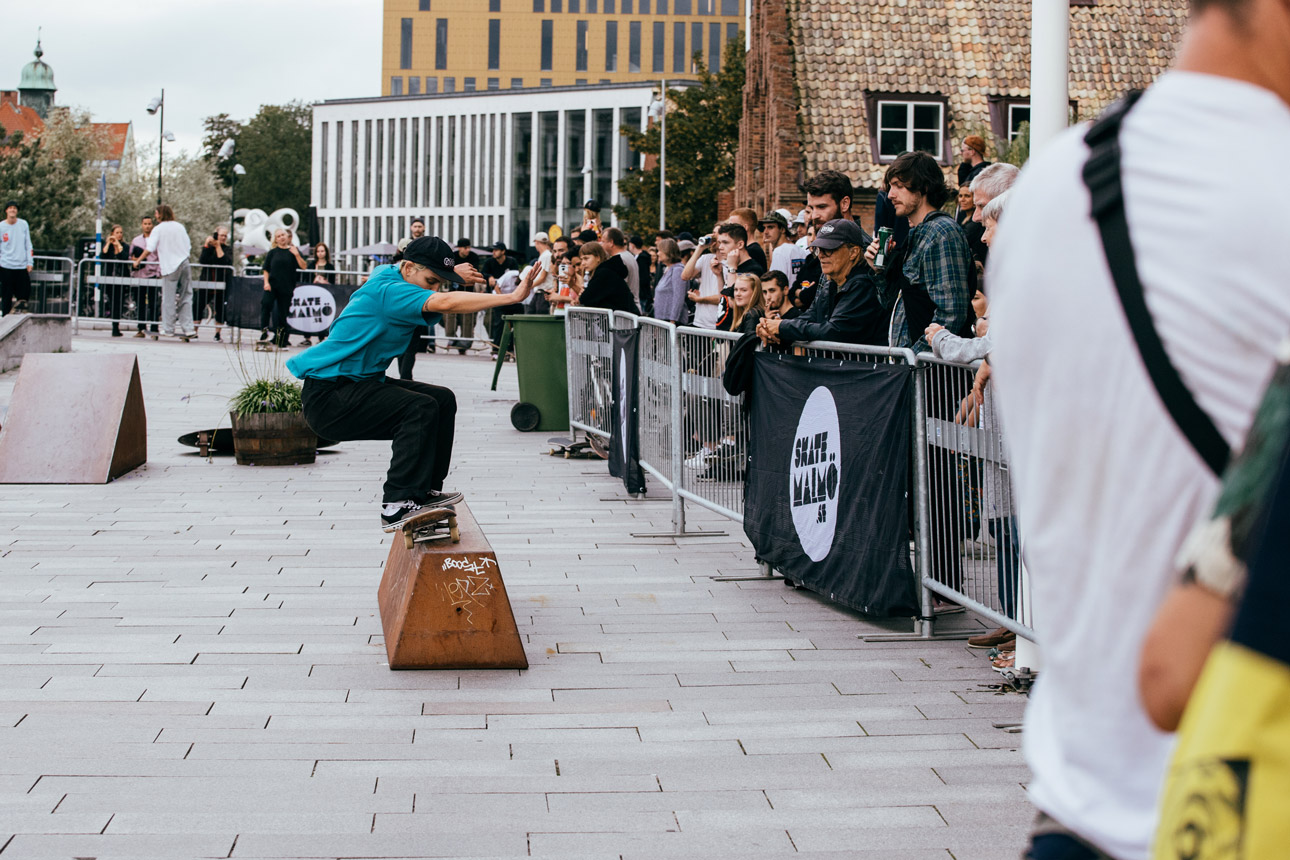
Fear is certainly a big hurdle, but most skaters will also rush to tell you about the rewards of a time when they overcame theirs. Emanuele Barbier for instance tells of how at Pushing Boarders “On the third day of the conference, I wanted to put down my camera and start skating a bit. I was reluctant to go skate at the Moriskan plaza because I felt intimidated by the number of men killing it there. But when I worked up the courage to do so, I ended up having a great time and making a new friend!”
So what helps us overcome our fears? Tara Porter of Neighbour Skateboarding who had traveled to Malmo from Melbourne, Australia found she felt much more confident trying tricks around skaters who were purposely supportive but not in an egotistical way. When other skaters take time to see what another skater is about, and believe in their potential successes, there is good times all around. Tara states, “I was trying to nail the axel stall, and even though I didn’t get it, I felt so encouraged and supported. Instead of people (i.e dooods) giving me unsolicited advice (which happens a lot back home), I got lots of ‘you can do it!’, ‘omg, that was so close, you can’t stop now!’”
Joana Fongern also provides another example of how positive environments increase the confidence of skaters who may be minorities at the typical skatepark or skate spot. She recalls, “I had the most fun skating with the people that were there at the time, because we cheered for each other and this got me so hyped that I actually landed my tricks!” For her, “a bad habit I left behind after Pushing Boarders, was self-doubt and disbelieve in myself. Throughout the week, I met many beautiful and smart people that made me feel safe, comfortable and definitely pushed my self-esteem to the highest… because I had people skating with me and believing in me!”
Kim Woozy also supports the idea “to find friends that are into the same thing as you and are down to give up judgement and caring about what others think. Even if it’s just one friend, as long as you have each other it will be awesome”. Rachael Sherlock adds, “Be unapologetic and take your space and take your turn. Even if you go to a park but it’s busy and full of people shredding hard and fast, you all have an equal right to skate those ramps”. She also advises that, “Alternatively, you can always pick a park to skate in the morning when it’s quiet. But never be shy when the park gets busy to take up space for yourself”.
Dr Dani Abulhawa also suggests the ways skate architecture is designed can also make a difference, “I think that when spots and spaces are designed they could take into account the barriers to entry for people like me. It’s a democratic thing — public spaces should be available to as many people as possible, to express themselves through movement”. The involvement of more womxn and non-binary skaters in urban planning, skateparks, DIY projects and skate-friendly city designs was raised in the panels at Pushing Boarders, notably the Sacred Spots panel that had Dr. Pollyana Ruiz and was co-chaired by Betsy Gordon (with Gustav Eden), and the Bad Design is a Crime panel with Kristin Ebeling (especially in the Q&A from womxn in the audience working and doing research in these areas). Helena Long, who was at the Spaces Workshop also recommends that it helps, “to understand that your ability within skateboarding is always going to be down to you and your choices as an individual…. Think more creatively about how you can adapt your skateboarding ability to a spot or obstacle and this can help change your perception on things in a much more positive way”.
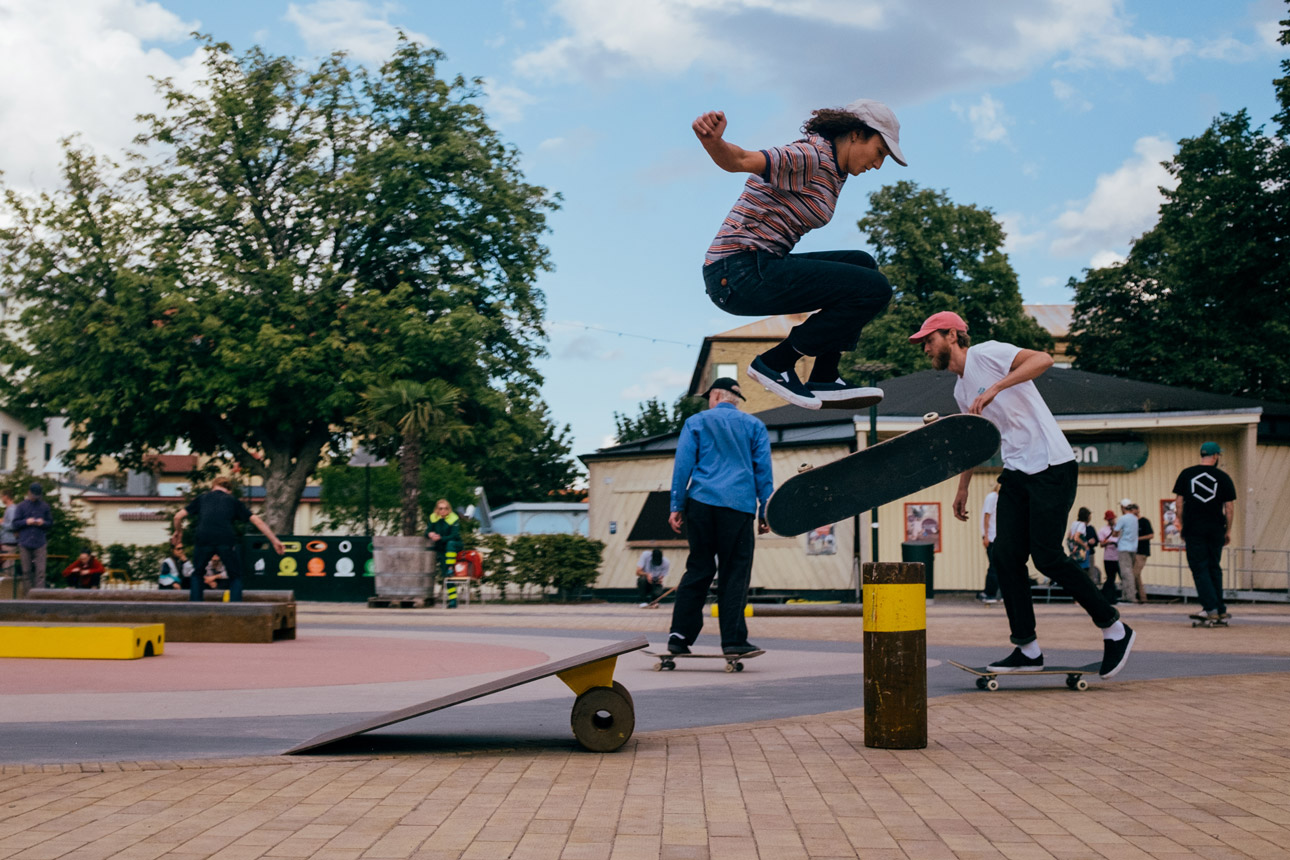
The types of social environments that womxn and non-binary skaters say help them to get rolling strongly backs the rationale to have specific skate events for them. This is not to say everyone should segregate and never skate together. But having special occasions for minority skaters to feel part of the majority for a change, to blend in, and to be around skaters who share similar fears and doubts, can make a real difference to their progression, confidence and ability to just rock up and rip wherever, and with whoever they want. What does not to work, and makes some womxn and non-binary skaters want to just leave, is when more experienced skaters let their ego cloud seeing others clearly, offering patronizing and unasked for advice, and saying things like ‘you’ve got this’ when someone is actually just doing a lazy warm up trick they have on lock. See a girl doing kickflips? Don’t be this guy in the satirical The Nut Daily News. Can she do a trick you haven’t tried? Don’t be this guy either. But this is not to say do not engage. All of us, from any gender, doing anything at the skatepark can be awesome to each other like these guys from Arizona. Nice one!
Any article on mental health will have to carefully chart a lot of difficult and complex territory and will be unable to cover everything, everyone and every resource. This is definitely the case with this article too. Like the dominant population in the skateboarding scene, a top priority for womxn, gender fluid, non-binary and queer skaters is to also just be doing our thing and to be present without pressure to be anyone else. The idea of being ‘present without pressure’ can apply to pro-skaters who hit the stadiums and podiums as much as the skater in their earliest days rolling. It is OK to be present in this world without pressure to be anything more. Next up, in the third and final article on Pushing Boarders, the ‘class of 2019’ focus on what steps they feel can make skateboarding more inclusive in 2020. Stay tuned.
Beyond Blue – General Mental Health Resources
Beyond Blue – Suicide Prevention
Life Line (free and confidential)
Ben Raemers Foundation
Mental Health America
Article: National Suicide Prevention Line (USA)
Why So Sad? (USA/UK/Scotland/Australia)
The Trevor Project (LGBTIQA+)
Vent City #12 ‘Mindset Economics’ — Podcast Show on skateboarding. Show #12 discusses mental health and counsellors (including how to find free services in the USA)
Stigma Fighters
Photos: Norma Ibarra
Text: Indigo Willing
Pushing Boarders is the world’s only skateboarding conference, connecting a wide range of socially progressive groups and individuals, from emerging…
In "Skateboard Like a Girl: Pushing Forward," Vanessa Torres shares her experiences in skateboarding and why having female role models…
Di’orr Greenwood’s skateboarding story is multifaceted and powerful, from rolling with a fun loving and hard-shredding all women’s crew, to…
The latest news, event invites and Yeah Girl exclusives direct to your inbox.
Site designed by BLNKT and built by Thirteen Digital